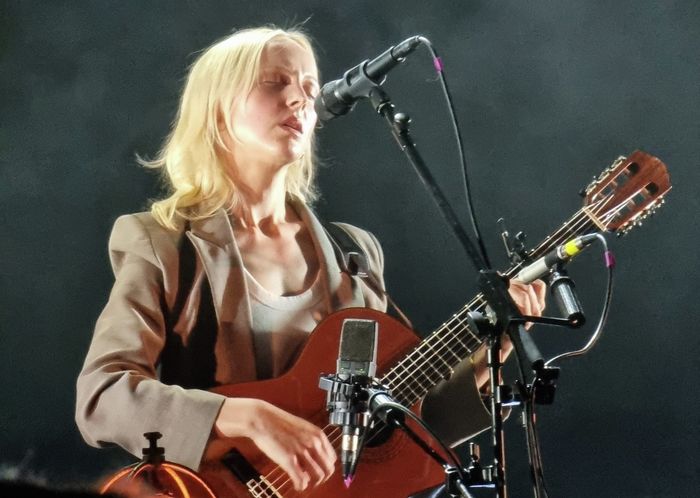An evening of travel and transformation: Cambridge University Orchestra review
West Road Concert Hall came alive with the sounds of Gipp’s English Pastoral scenes and Rodrigo’s Latin Bravado, writes Immy Rowe in her review of the concert
On the 20th of November, West Road Concert Hall was abuzz with fervent anticipation. A cacophony of preliminary excitement flowed from the foyer and into the shelter of the auditorium. As the lights slowly dimmed, our focus was changed to the bright light emanating from stage left. Out of this light, like a phoenix, Natalia Luis-Bassa rose to rapturous applause. With her incredible amount of passion and energy, and its osmotic effect on both the audience and the orchestra, the tone of the evening became established.
The galvanising impetus of her command awakened the orchestra into consciousness. Thus began the CUO rendition of Ruth Gipps’s Song for Orchestra Op.33 in its uniquely voiced pastoral nature. The ever unfolding strings provided a beautifully meditative accompaniment for the impressively controlled Debussy’s Syrinx-esque oboe solo performed by 2nd year Alice Rivers. Notably, during the first brass entry at the climactic central section, the balance between the lower brass and the high register parallel strings was masterful and surprisingly one did not outweigh the other. It more resembled the relationship between an alto and a baritone in terms of tone colour and this was glorious to behold. Additionally, the strength in the second violins at this part was also a stunning compliment to the tune and interplayed incredibly well against the first violins.
On Saturday evening the Cambridge University Orchestra returns to West Road, joined by conductor @NataliaLuisB, professor of conducting at the Royal College of Music, and @kevinlohguitar, joint-winner of the CUMS 2020 Concerto Competition.https://t.co/cUwoFgr43j pic.twitter.com/yj2Hb2m1kR
- West Road Concert Hall (@WestRoadCH) November 18, 2021
The final section of this work was artfully performed and controlled by both Luis-Bassa and the CUO. Much like the rumble one hears before a stampede, the violins performed a tremolo against the initial clarinet figure which created the idea that the musical progression was precariously on the edge of something much bigger. This lowers to a soft hush, and the stampede we once expected fails to arrive. Instead we are left as we began, with Alice Rivers and her gorgeous oboe.
“Loh’s immaculate enunciation was crystalline in its clarity”
Kevin Loh next arrived and pulled us into a complete worldly and tonal transformation with the Rodrigo Concierto de Aranjuez Condi. Loh enters the auditorium with the bravado of a well-seasoned Toreador sitting down confidently, taking his time to position himself, with the silent security that he still maintained all of our attention. Loh’s immaculate enunciation was crystalline in its clarity. Musically, Loh’s playing demonstrated a dichotomous nature, a contrast between the most polite and well-controlled scalic figurations and ferocious strums that seemingly bounced around the walls of the auditorium. Combined with more masterful orchestral timing, on behalf of our conductor, the string section began to fulfil an almost percussive role – imitating the snaps of a castanet in habanera rhythms.
Another triumph of this orchestral performance could be seen in the string glissandi just before the return of the B section. It was so intuitively timed by both Luis-Bassa and the players, that if one was not watching the performance, the sound would have appeared as an amplified moment performed by a singular instrument.
After a playful and mischievous ending of the first movement from Loh, we are lulled into the meditative and ever-progressing second movement. It is here that Loh’s true versatility as a performer is apparent. He plays this movement with such delicacy, as if he was trying to guide a young child to sleep. It felt as though he had sympathetic strings during the unaccompanied section. His masterful playing was so continuous and ever-flowing, that as he moved on, the previous note was still left reverberating in West Road’s acoustic.
This glorious free flow becomes swiftly contrasted at the end of this movement by Loh’s arguably most dramatic and rigorous playing of the evening. Accompanied by an emphatically controlled full orchestral tutti, there occurred a peekaboo emergence of the Brass section that was truly powerful in this string dominated work. It was at this moment I felt the reminder of why people chose to do music. This concert having been one of the first full orchestral works much of the audience had seen in months, there was a shared intake of breath as everyone felt their hearts lurch out of their chest. Loh, Luis-Bassa and CUO had us all in the palm of their hands.
After a glorious final movement all the players rose to rapturous applause. Loh was called back on stage countless times to receive our appreciation, and courteously shook the hand of the first violinist every time, to her surprise at each initiation. He was a pleasure to watch. During a 10 minute recess, the foyer was filled with chatter. Overhearing comments such as “It was one of those performances that you held your breath for”, it reaffirmed what most of us were already feeling – it was an incredibly special performance.
 News / Candidates clash over Chancellorship25 April 2025
News / Candidates clash over Chancellorship25 April 2025 News / Cambridge professor paid over $1 million for FBI intel since 199125 April 2025
News / Cambridge professor paid over $1 million for FBI intel since 199125 April 2025 Interviews / Dr Ally Louks on going viral for all the wrong reasons25 April 2025
Interviews / Dr Ally Louks on going viral for all the wrong reasons25 April 2025 Music / The pipes are calling: the life of a Cambridge Organ Scholar25 April 2025
Music / The pipes are calling: the life of a Cambridge Organ Scholar25 April 2025 Comment / Cambridge students are too opinionated 21 April 2025
Comment / Cambridge students are too opinionated 21 April 2025






